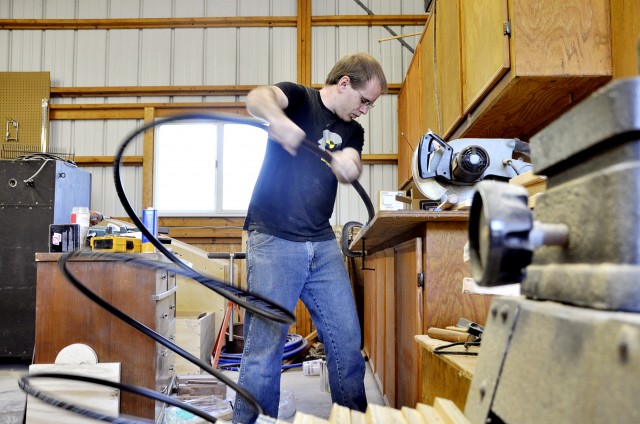For UT Student, Making Quidditch Gear Is Big Business

University of Texas senior Kevin Peterson works on quidditch hoops in the garage workshop of his father’s South Austin home. The hoops sell for $300 for a set of six. Photo by Megan Strickland.
By Megan Strickland
For Reporting Texas
The broomsticks Kevin Peterson makes aren’t magical, but that hasn’t stopped them from flying off the shelves.
Peterson, a University of Texas senior, is poised to become the sole manufacturer of official gear for quidditch — a real-life sport inspired by the Harry Potter novels — if the sport’s governing body adopts his designs.
“I would love Peterson’s Broomsticks to be to quidditch what Rawlings is to baseball,” he said, referring to the sports equipment manufacturer that is the official supplier of balls and helmets to Major League Baseball.
Peterson said he never expected to end up manufacturing quidditch gear when he joined UT’s team three years ago. He wasn’t even sure anyone else would show up for practice. But the sport had a bigger following than he realized.
Quidditch began as a fictional sport in J.K. Rowling’s best-selling Harry Potter novels, where students at the Hogwarts wizard-training school ride flying broomsticks while throwing balls through hoops suspended in the air. Since 2005, a real-world, on-land adaptation of the game has spread to U.S. colleges and high schools. The International Quidditch Association, the sport’s governing body, said that more than 100 teams have registered to compete in the sixth annual World Cup, to be held April 14 in Kissimmee, Fla. There are more than 1,000 teams worldwide, according to the association.
Despite quidditch’s popularity, no one manufactures the gear needed for the sport, so players borrow volleyballs, dodgeballs and tennis balls and make their own goals — hoops mounted five or six feet off the ground. Teams of seven players “ride” the brooms while trying to throw balls through the hoops. The game ends when one team grabs the Golden Snitch — often a tennis ball encased in pantyhose — from a designated player on the opposing team.
Unless team members have some engineering skills, hoop design can be difficult, Texas Quidditch president Allyson Burton said. “The hoops would fall apart, and we would have to tape them and tie them back together. It was just awful.”
Becca Du Pont, the International Quidditch Association Southwestern Region representative, said the lack of equipment regulation greatly affects the game. “There’s definitely a home field advantage right now, because most of the time, everyone plays with different equipment,” DuPont said. “There’s been talk about standardizing equipment in the next couple of years because of frustrations with that situation.”
Peterson said he’s been in talks with the association to have his broomstick and hoop designs designated as the official design of the sport. After Peterson’s equipment became popular among regional teams, the IQA commissioned him to manufacture 80 hoops for use in next week’s World Cup. He’s also manufacturing the event’s custom trophies.
The hoops, $300 for a set of six, are Peterson’s best seller; unlike broomsticks, no one else manufactures them. His current design is the result of more than two years of trial and error. Evidence of the evolving design, including kinked hula hoops with battered metal brackets and broken PVC pipe fittings, is scattered around his father’s garage in South Austin.
Peterson is a one-man assembly line. He starts by cutting round bases from half-inch thick plywood, then cuts polymer tubing into sections that he bends into hoop shapes and secures with plastic fittings. Flanges screwed to the bases hold pipes that will connect to the hoops.
Wearing a white protective suit, he then spray-paints the assemblies in a painting booth improvised from plastic sheeting.
To make the broomsticks, he simply grinds both ends of one-inch dowel sticks to round them off, then varnishes them. He sells them without the bristles for $20 each. But the brooms have high- and low-end competition. An online Harry Potter novelty shop, Alivan’s, makes brooms that start at about $50.
“To buy a set of Alivan’s brooms is close to $900, and for most of the teams that’s unattainable,” Peterson said. “That’s a significant investment most schools can’t afford to make.” On the other hand, grocery store brooms are $8.
For an extra charge, Peterson customizes his brooms in team colors; Texas Christian University ordered a set in purple and white. He said he’s sold 75 brooms and 100 sets of hoops.
Peterson said he’s improved his design and reduced shipping costs over the past year. He said he would love to expand to ball production but lacks the time and money. Plus he’s still trying to graduate with a degree in biology.
“It doesn’t pay rent right now,” Peterson said of his quidditch venture. “I hope it will someday. I’ve been presented with the idea too that quidditch might be this passing fad that will die off in a few years. That could be true, but there’s also been talk about professional quidditch in the future. If the sport is going to take that next step, it’s going to need official gear. I’d like to be the person who makes that.”